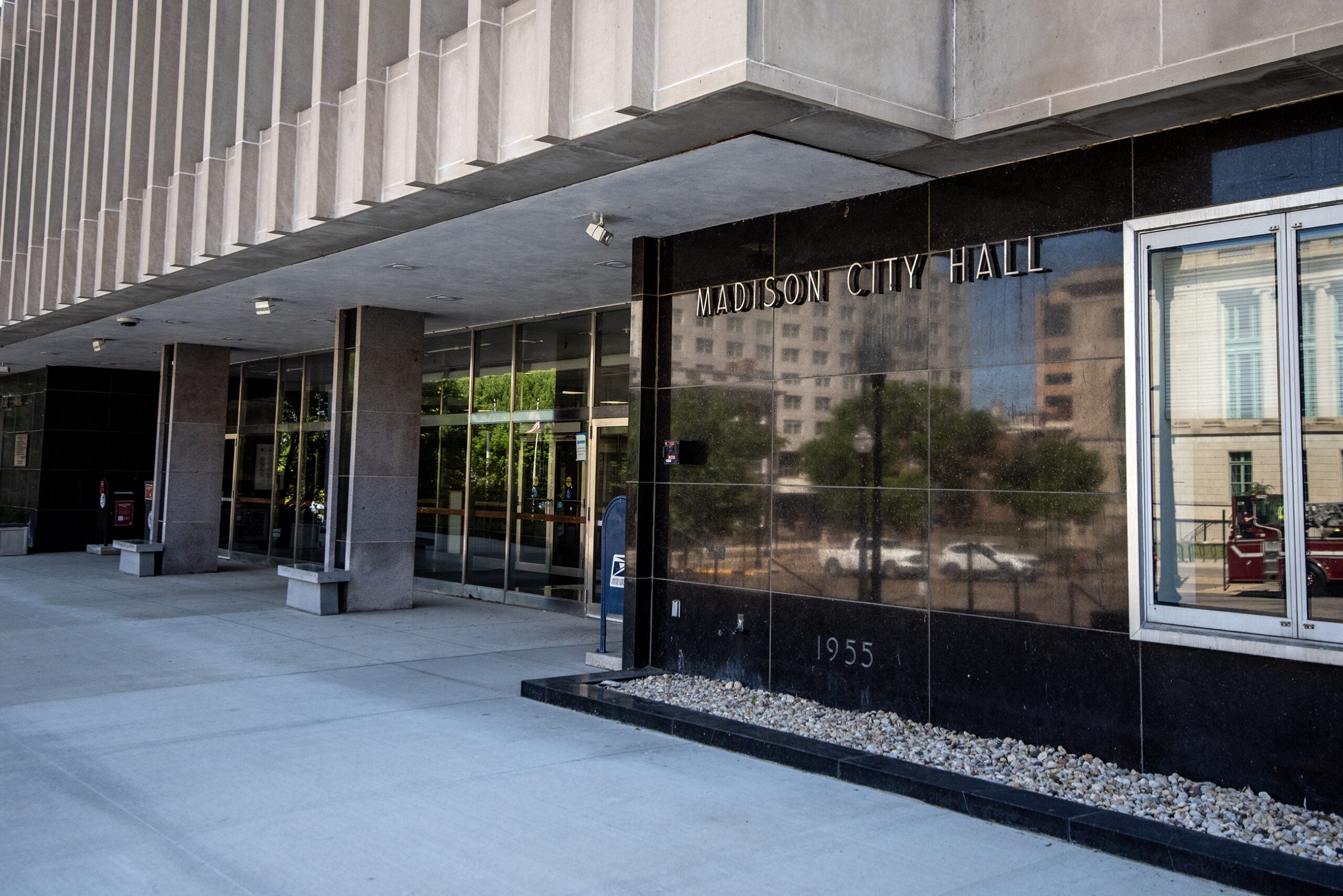The Green Bay Common Council voted Tuesday night to remove audio devices from city hall and to destroy the recordings once the lawsuit over the issue is resolved.
The council also approved an ordinance amendment giving it authority over the use of audio devices in city hall. That power was previously held by the mayor, who is responsible for overseeing the day-to-day operations of city hall.
“We want to use our power as a governing body to make sure that we say we have control over audio surveillance, because we can’t lightly brush aside valid constitutional concerns,” Council President Jesse Brunette said. “This is not a settled court case.”
News with a little more humanity
WPR’s “Wisconsin Today” newsletter keeps you connected to the state you love without feeling overwhelmed. No paywall. No agenda. No corporate filter.
During the nearly six-hour meeting, council members said they were not made aware when recording devices were added to three security cameras in city hall. They also received clarification on how and when city hall staff were notified about the devices.
Joe Faulds, chief of operations for the city of Green Bay, told the Common Council that staff were notified via email in December 2021 of devices on the second floor, but no email went out regarding devices added on the first floor in the summer of 2022.
Signage wasn’t installed until after the issue was brought up by Alder Chris Wery at a council meeting last month.
Alder Mark Steuer said better communication would have helped avoid some of the issues.
“It was just poor communication,” he said Tuesday night. “Maybe the administration thought, ‘We can move ahead and just do this,’ but just a simple discussion with us letting us know would have really helped.”
The Green Bay Police Department, Mayor Eric Genrich, City Clerk Celestine Jeffreys and City Attorney Joanne Bungert had access to the audio and video storage. Genrich and Jeffreys said they have not reviewed audio. Bungert said she had viewed it in the process of responding to open records requests and in reviewing an internal personnel matter.
The meeting came as the city and Genrich face a lawsuit from the Wisconsin state Senate; state Sen. André Jacque, R-De Pere; former Green Bay Alder Anthony Theisen and an unnamed Jane Doe, who was revealed to be local attorney Janet Angus.
The suit argues the city’s use of audio devices violates Wisconsin’s Electronic Surveillance Control Law, the state constitution, the U.S. Constitution and other state statutes.
Last week, Brown County Circuit Court Judge Marc Hammer issued a temporary order preventing the city from using the audio devices and releasing audio records while litigation continues. He also denied a request for Jane Doe to proceed anonymously.
In court documents, the city said audio equipment was installed in response to concerning incidents at city hall. The city detailed three incidents, two involving staff and one involving a reporter.
One of those incidents involved Angus, who initially joined the lawsuit as a Jane Doe. Ted Waskowski, an attorney representing the city, said he was informed by lawyers representing those suing the city that Angus was the Jane Doe.
Angus was involved in a confrontation in the city clerk’s office in April 2022 that ended with a voter crying and being escorted to her vehicle, according to a police report. Angus was cited for disorderly conduct in municipal court.
In another incident, the Green Bay Press Gazette informed the city that one of its reporters was verbally harassed by four members of the audience after a November 2021 council meeting, according to a letter the newspaper sent to the city.
During Tuesday’s meeting, Genrich said the upgrades to the city’s security system were made to ensure the safety of staff and members of the public, and were done with guidance from the police department.
“People in good faith can have disagreements about how best to keep people safe here within our city hall,” Genrich said. “But the debate before us tonight, as I think many recognize, has not been advanced in that way. Instead, it’s been characterized by bad faith and dirty politics at every turn.”
Some alders said the timing of the lawsuit appeared suspect, others questioned why signage wasn’t installed along with the audio devices. Members of the public also expressed concern about the lack of signage and transparency.
“Without signage from the get go, the audio is rolling (but) no one knows,” resident Rhonda Sitnikau said during the public comment portion of the meeting. “The odds of deterring nefarious activity are slim to none. We all know this because when we have security systems in our homes or anywhere else, there’s signage.”
The meeting also saw interruption and bickering between alders, as well as some outbursts from members of the public.
Alder Brian Johnson questioned both the timing of the lawsuit and lack of council input on the security upgrades.
“It stinks on both sides — it really does,” he said. “But the reality is, we have this issue before us now and we have to act on it now. Because it’s before us, and it is within our jurisdiction and purview to do it.”
He said giving the council authority over audio devices in city hall gives alders the opportunity to have a broader discussion about safety concerns.
“Twelve people making that decision is better than one,” he said. “I think all of us here are concerned about the safety of our staff, and I don’t want that to get diminished in this discussion.”
A few other municipalities in Wisconsin use audio devices in their security systems. The Brown County Sheriff’s Office has three cameras that can record audio, one in the foyer and two in the lobby — all three are accompanied by signage. Racine has seven audio/visual cameras within its city hall and police department that are visible to the public. And Oshkosh has audio recording equipment on the staff side of some customer service counters with signage posted.
While other government entities and private businesses may use audio devices, Jay Stanley, a senior policy analyst for the American Civil Liberties Union, said he believes such devices are an intrusion of privacy.
“There’s a real potential that government agencies and companies will increasingly have the ability to watch us all the time, listen to us all the time or much of the time,” he said. “We have to be very conscientious about not allowing these technologies to creep into our public spaces and really change the nature of life in our country.”
Stanley said using audio devices in public spaces is wrong, regardless of whether signage is posted, but said it’s better to have signage than not to have signage.
Several alders questioned how the audio devices were supposed to act as a deterrent when no signage was posted.
“If the purpose of installation was safety, then why secretly install them and not put up signs? Isn’t signage the whole point of deterring bad actions?” Wery asked Genrich and Bungert during the meeting.
Bungert said she couldn’t answer that question without potentially impacting the city’s legal strategy in the lawsuit.
“Those are questions that are being raised in litigation, so, clearly, we can’t talk about it,” she said.
The council was also briefed on the status of the lawsuit in closed session. A timeline was not set for removing the audio equipment.
Editor’s Note: This story has been updated to correct which floor city staff were notified about via email when audio devices were installed.
Wisconsin Public Radio, © Copyright 2026, Board of Regents of the University of Wisconsin System and Wisconsin Educational Communications Board.






